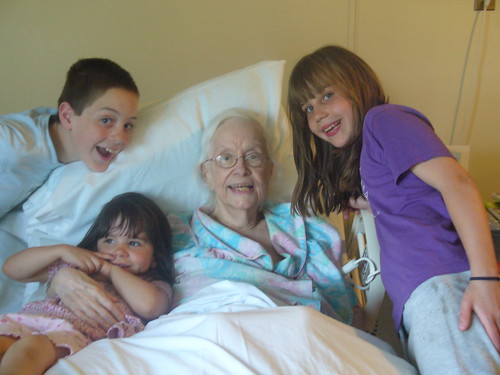The homeschool community is mourning the loss of Chris Klicka this week. His wife has been graciously sharing her time with Chris on his CaringBridge Journal. As I was reading Mrs. Klicka’s touching posts I was struck by how helpful and involved her experience with hospice seemed to be.
So with great sadness and with a joy that we can barely contain, we announce that our husband/father Chris has gone home to be with the Lord. He slept peacefully lsat night, though his breathing was shallow and very rapid. Then this morning when the hospice nurse came to check him over, she commented specifically how low his blood pressure had gotten and that with the mottling around his knees and ankles, grayer skin tone and coldness in his face, that he didn’t have much time left with us.
After Anna (the hospice nurse) took Chris’ vitals a second time, his blood pressure having dropped some more, she recommended that I get our kids down to see and talk to their dad.
How wonderful. That is EXACTLY what I thought our experience with hospice was going to be, but wasn’t. I have mentioned before on this blog that the day mom died her condition had markedly changed with shallow breathing, glassy eyes, purulent odor, greenish vomit etc. And while I was certain this was a turn for the worse I had it in my mind that this was going to be the beginning of a siege. That this was going to go on for hours and hours, maybe days. I don’t know where I got that idea, but it was reinforced by something the hospice nurse said to my sister. When Sis had been visiting mom six hours before her death she mentioned how much worse mom had become and she asked the nurse when she thought mom would pass. To which the nurse replied, “In God’s time. Only God knows.”
That was an ice platitude and I’m sure she meant well but it certainly wasn’t helpful. She should have told us that when the eyes are glassy it’s a matter of hours. That the shallow panting breathing meant death was imminent. We certainly could have made more informed choices if she had just leveled with us. I contrast that experience with the Klicka family who had time to gather together and be there when their husband/father/friend passed.
I was there an hour or so before mom passed. There was no one from hospice in sight. The nursing home nurse came in and I asked her to give mom oxygen to help ease what I perceived as struggling for air. And that was about all the help and guidance we received. The next time I saw anyone from hospice they came in to document Moms’ death. She didn’t even have the number for the funeral home which I had to assist her with.
I have found these questions for hospice but they seem kind of trivial to me. At this point it doesn’t seem important to me whether a hospice has all of their accreditations in place. I want to know if they are going to be there to help me, or not. I want to know that they’re going to keep me fully in formed and not just spout touchy feeling platitudes.
The first time I met with the hospice representative she told me that 86% of patients die without family present. I wonder now if that’s how they cover themselves from being proactive enough in measuring the status of their patients.
According to the Hospice Foundation, these are the goals of Hospice:
The partnership formed between a family and hospice personnel can ensure quality care for a person who is dying. Hospice supportive services are designed to offer information and back-up to family members so that they will be more able to care for their loved one. Hospice care focuses on addressing some central goals:
* To support individuals and families coping with dying
* To enhance quality of life through comfort care rather than treatment focused on cure
* To aggressively treat and expertly manage all pain and physical symptoms associated with an individual’s dying
* To care for the whole person, addressing physical, emotional, psychological, spiritual, and social needs through an interdisciplinary team approach
* To confirm the individual’s and family’s sense of self worth, individuality, autonomy, and security
* To acknowledge and offer support for individuals and their family members facing the losses and grief associated with dying and the death of a loved one
* To extend bereavement support for family members following the death of their loved one
* To be a positive influence upon the understanding, compassionate treatment, and care of the dying and bereaved
If I had to do it again I think I would do some things differently and one of them would be drilling a prospective hospice service on how they would manage pain and symptom control and how involved they would be in assisting me and my family in recognizing and coping with the last moments of life. If they can’t handle those two things then I really don’t see any point in signing on with them.

